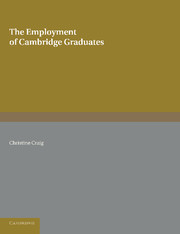Book contents
- Frontmatter
- Foreword
- Contents
- List of Tables and Diagrams
- I Introduction
- II The Graduates' Background
- III Current Employment
- IV The Rewards of Work: Earnings and Satisfaction
- V The Past and the Future
- VI The Men Working Overseas
- VII The Women Graduates
- VIII Summary
- APPENDICES
- I The Questionnaire
- II Degree Subject
I - The Questionnaire
from APPENDICES
Published online by Cambridge University Press: 05 June 2016
- Frontmatter
- Foreword
- Contents
- List of Tables and Diagrams
- I Introduction
- II The Graduates' Background
- III Current Employment
- IV The Rewards of Work: Earnings and Satisfaction
- V The Past and the Future
- VI The Men Working Overseas
- VII The Women Graduates
- VIII Summary
- APPENDICES
- I The Questionnaire
- II Degree Subject
Summary
General scope of the enquiry
The terms of reference were wide, in terms of both time and subject matter, and suggested some lines of enquiry which, so far as we know, had not previously been followed in a postal survey (as distinct from personal interviews). Questions about status and satisfactions inevitably involved expressions of opinion and subjective judgments and presented problems of definition and analysis which needed careful thought. It is often held that postal surveys should deal only with factual information; Scott, however, in a comprehensive review of research on mail surveys concludes that ‘on the existing published evidence, the mail survey does not appear to be necessarily any less efficient than the interview as a means of collecting information and opinions from the public, unless the questions or their interrelations are complex’.
In planning a postal questionnaire to cover so wide a time-span and range of activities we had to accept the fact that, if it was not to be unduly long, we should almost certainly have to omit either some of the detail or some of the items of information we should have liked to ask for. There is little published evidence about the limitations on length of a successful mail survey, and such as there is relates mainly to surveys of the general population, whereas we were dealing with a group which could be presumed to have some special interest in the enquiry. We therefore decided to subject the draft questionnaire to a fairly severe pilot test. Two successive versions were piloted for the men, and one for the women.
As a result of these trials, we concluded that we could not collect information which we could use as a meaningful measure of status and levels of responsibility, or which could afford a legitimate means of comparison between different categories of responsibility, but that questions on satisfactions produced answers which, while needing cautious interpretation, could be used to show general trends of opinion.
On the question of length, the pilot surveys suggested that Cambridge graduates would eventually respond well to a request from the University to fill in a rather long questionnaire, but that a fairly high proportion of them were unlikely to do this quickly, and that more than one reminder would be needed to obtain a high response rate.
- Type
- Chapter
- Information
- The Employment of Cambridge Graduates , pp. 94 - 99Publisher: Cambridge University PressPrint publication year: 2013

